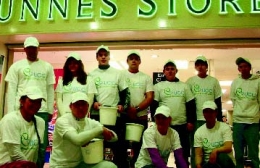In the early 1990s second-hand clothes were delivered to Lithuania from Germany by the truckload. But you couldn’t get anything – as soon as the trucks arrived they were stormed by a mob of grouchy old ladies, who would sometimes fight over an especially well-preserved item. The clothes would be gone in minutes.
These ‘truck runs’ are remembered well by Marius Okunevas, the man who set up United Children Care, an organisation which fundraises in Ireland for Lithuanian orphans.
He was a child at the time, and was “in the middle of the battle”, as he puts it, trying to get hold of at least a few good items of clothing.
But he didn’t grab the clothes for himself or – as was commonplace – to sell them on later. Along with his two brothers, Marius Okunevas was helping the children of an orphanage located just a half-hour’s drive from his home.
“Me and my brothers were actors in a local drama club,” he says. “We also had our own little band where we would perform circus tricks and break dance. Once we went to perform in the local orphanage and that’s how we met the kids.”
The band returned to the orphanage every three months to give a special performance, and the Okunevas brothers soon began to help in various other ways.
When Okunevas came to Ireland five years ago he still felt the urge to help. He lives here now with his wife and two children, working as a manager of a large Dublin retail store as well as having other business interests. Organising fundraisers and charity events takes up the rest of the time.
United Children Care (UCC) has around 40 volunteers, most of them Lithuanian students or school pupils in Ireland and their friends. The volunteers raise funds in supermarkets across the country by helping people pack their shopping. UCC also collects second-hand clothes from recycling companies, as well as from a network of Lithuanians living in Ireland who support the cause.
Okunevas says his company works with three established charitable organisations in Lithuania who “would not steal or sell” the aid sent from Ireland. UCC has also made contributions to African countries and has co-operated with well-known Irish charities like Make a Wish. The venture is successful, he says, with 17 tonnes of second-hand clothes sent to Lithuania last year.
The current goal is to build a health complex in Klaipeda City’s Rytas foster home for children, for which UCC aims to raise €430,000.
“So much aid is being sent to African countries,” says Okunevas. “But I’m not aware of a single charity in Ireland helping Lithuanian children.” He points out there are over 15,000 orphans in the eastern European country.
However, Okunevas says that because his organisation is made up almost entirely of Lithuanians, he faces “mistrust and suspicions” from authorities regulating the work of charities.
“We could raise more money and send more aid, but currently our hands are tied,” he said. “The first question they ask is why there are no Irish directors in our organisation. To me it sounds like discrimination.”
After a number of frauds posing as charities were exposed, the State is stepping up regulation for charitable organisations, and the Charity Bill 2007 is now almost certain to be passed. This bill will make it illegal for charities to fundraise without a valid permit and identifiable labelling. But Okunevas is determined that his organisation will satisfy all the requirements.
“We’re not trying to fool anybody,” he said. “Let [the Irish authorities] send their representatives and we’ll show them exactly what we do.”












